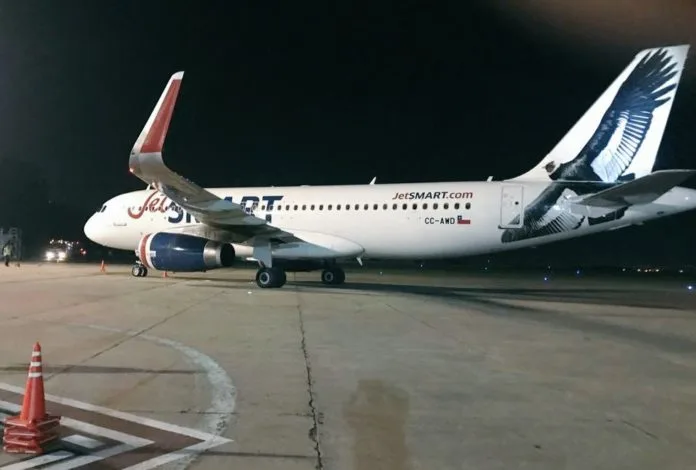In a new development, JetSmart, known for low-cost flights to Chile and Uruguay, aims to offer domestic services in Brazil.
The company is a South American ultra-low-cost carrier established by US investment fund Indigo Partners, which controls other airlines like Frontier, Volaris, and Wizz Air.
It operates primarily out of Arturo Merino Benítez International Airport in Santiago, Chile.
Veronica Alvarez, International Markets Manager, shared this news with EXAME magazine.
She explained that using their new 120-plane fleet efficiently requires operating in Brazil. Alvarez mentioned, “With 32 planes now and more coming, we need Brazil for our growth.”
Starting operations in Brazil faces delays due to red tape and legal issues. Yet, Alvarez sees these as chances to improve customer service.

Founded in 2016, JetSmart is a budget-friendly airline. It keeps ticket prices low but charges for extras like seat selection and snacks.
It’s part of the US-based Indigo Partners, which also invests in other budget airlines worldwide.
JetSmart already connects Brazilian cities to Chile, Argentina, and Uruguay.
Entering Brazil’s domestic market aims to expand its South American footprint, competing with giants like Latam and Avianca.
Brazil currently lacks genuine low-cost domestic flights. Airlines offer some low-cost services but not low fares.
WebJet was an exception, offering real bargains until GOL acquired it in 2012.
JetSmart’s entry could stir the Brazilian market, promising competitive fares. However, regulatory and bureaucratic challenges have deterred similar ventures before.
We’ll watch JetSmart’s journey, potentially transforming Brazil’s air travel landscape.
Background
In 2023, Brazil’s aviation industry rebounded from COVID-19 and surpassed 100 million passengers, a four-year milestone.
By November, the National Civil Aviation Agency (ANAC) reported airlines carried 102.6 million passengers, a 5.1% increase from last year.
This includes 83.5 million on domestic flights and 19.1 million internationally.
Despite challenges like a strong dollar, high fuel costs, and complex tax structures, the industry showed resilience.
In November, domestic airlines experienced a 2.7% increase in passengers, carrying 7.6 million, while international routes saw a 19.6% rise with 1.7 million travelers.
Domestic flight demand rose by 2.3%, with stable seat supply, yielding an 82.9% occupancy rate.
The international sector saw a 15.2% increase in demand and a 14% rise in supply, filling planes to 83.3% capacity.

